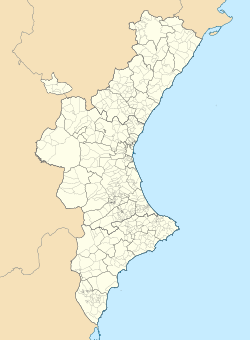Valencia (Spain)
|
Valencia València (Valencian) |
|||
|---|---|---|---|
| Municipality | |||

Clockwise from top: City of Arts and Sciences, modernist buildings in Town Hall Square, Silk Exchange, Queen Square with a view of the Cathedral and its tower the Micalet, Business Offices in France Avenue, the America's Cup port and the Malva-rosa beach.
|
|||
|
|||
| Location of Valencia within Spain / Valencian Community | |||
| Coordinates: 39°28′00″N 0°22′30″W / 39.46667°N 0.37500°WCoordinates: 39°28′00″N 0°22′30″W / 39.46667°N 0.37500°W | |||
| Country |
|
||
| Autonomous Community |
|
||
| Province | Valencia | ||
| Comarca | Horta de València | ||
| Founded | 138 BC | ||
| Districts |
List
|
||
| Government | |||
| • Type | Mayor-council government | ||
| • Body | Ajuntament de València | ||
| • Mayor | Joan Ribó i Canut (2015) (Compromís) | ||
| Area | |||
| • Municipality | 134.65 km2 (51.99 sq mi) | ||
| Elevation | 15 m (49 ft) | ||
| Population (2010) INE | |||
| • Municipality | 809,267 | ||
| • Density | 6,000/km2 (16,000/sq mi) | ||
| • Urban | 1,570,000 | ||
| • Metro | 1,705,742 to 2,516,818 | ||
| Demonym(s) | Valencian valencià, -ana (va) valenciano, -na (es) |
||
| Time zone | CET (GMT +1) | ||
| • Summer (DST) | CEST (GMT +2) (UTC) | ||
| Postcode | 46000-46080 | ||
| ISO 3166-2 | ES-V | ||
| Website | www.valencia.es | ||
Valencia (/vəˈlɛnsiə/; Spanish: [baˈlenθja]), officially València (Valencian: [vaˈlensia]), on the east coast of Spain, is the capital of the autonomous community of Valencia and the third-largest city in Spain after Madrid and Barcelona, with around 800,000 inhabitants in the administrative centre. Its urban area extends beyond the administrative city limits with a population of around 1.5–1.6 million people. Valencia is Spain's third largest metropolitan area, with a population ranging from 1.7 to 2.5 million depending on how the metropolitan area is defined. The Port of Valencia is the 5th busiest container port in Europe and the busiest container port on the Mediterranean Sea. The city is ranked at Gamma+ in the Globalization and World Cities Research Network. Valencia is integrated into an industrial area on the Costa del Azahar (Orange Blossom Coast).
Valencia was founded as a Roman colony by the consul Decimus Junius Brutus Callaicus in 138 BC, and called Valentia Edetanorum. In 714 Moroccan and Arab Moors occupied the city, introducing their language, religion and customs; they implemented improved irrigation systems and the cultivation of new crops as well, being capital of the Taifa of Valencia. In 1238 the Christian king James I of Aragon reconquered the city and divided the land among the nobles who helped him conquer it, as witnessed in the Llibre del Repartiment. He also created a new law for the city, the Furs of Valencia, which were extended to the rest of the Kingdom of Valencia. In the 18th century Philip V of Spain abolished the privileges as punishment to the kingdom of Valencia for aligning with the Habsburg side in the War of the Spanish Succession. Valencia was the capital of Spain when Joseph Bonaparte moved the Court there in the summer of 1812. It also served as capital between 1936 and 1937, during the Second Spanish Republic.
...
Wikipedia





